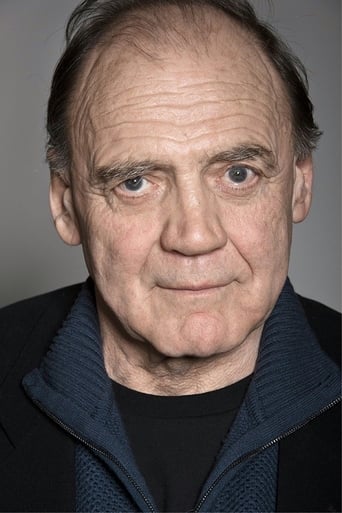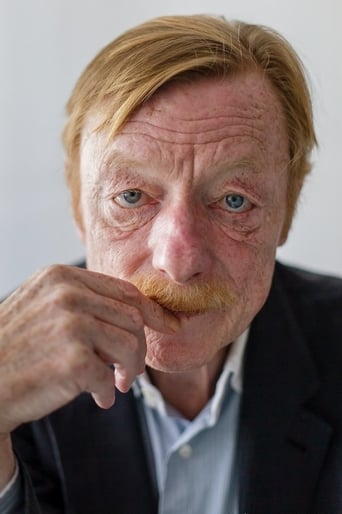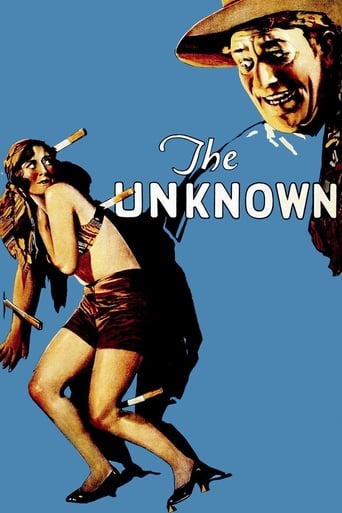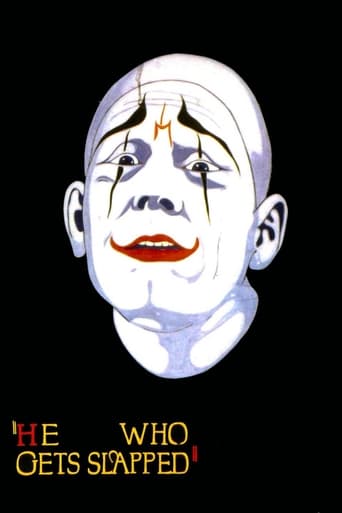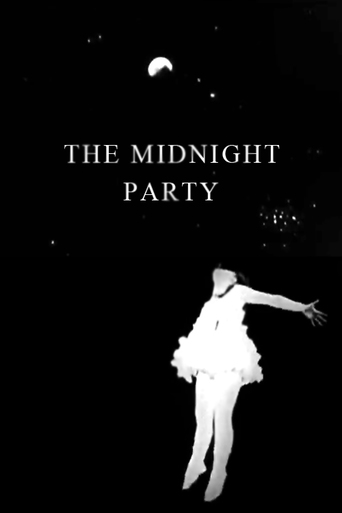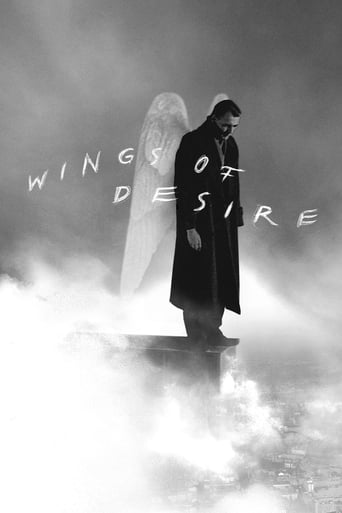
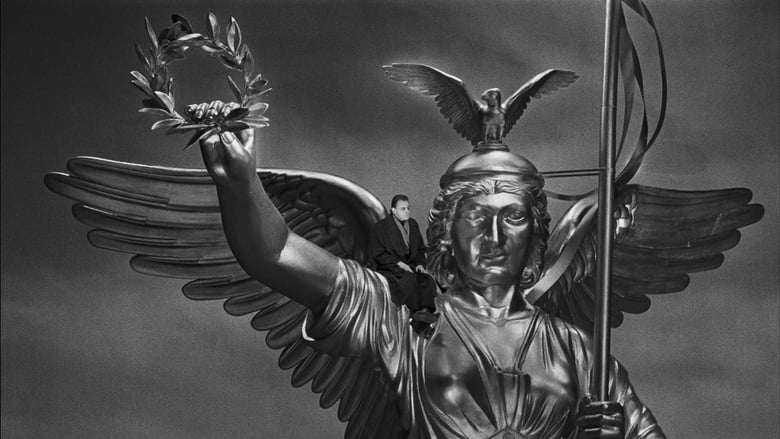
Wings of Desire (1988)
Two angels, Damiel and Cassiel, glide through the streets of Berlin, observing the bustling population, providing invisible rays of hope to the distressed but never interacting with them. When Damiel falls in love with lonely trapeze artist Marion, the angel longs to experience life in the physical world, and finds -- with some words of wisdom from actor Peter Falk -- that it might be possible for him to take human form.
Watch Trailer
Cast
Similar titles
Reviews
Pretty Good
Please don't spend money on this.
it is finally so absorbing because it plays like a lyrical road odyssey that’s also a detective story.
It is neither dumb nor smart enough to be fun, and spends way too much time with its boring human characters.
There is good and bad critique around for this film, some people have problems with the pace at which the film runs, others take issue with the Director himself saying he might have been better as a photographer not a film-maker. But in my opinion these people completely miss the purpose of this movie. The Director Wenders, wanted to make something different, something alternative to the guaranteed ticket selling films.This film doesn't feed adrenaline junkies with high speed car chases or gun slinging shoot outs. Nor does it have oodles of sex.What this movie does have is a wonderful storyline but one that doesn't draw you in like some movies in this one you feel like your observing the events almost like a witness - from a distance what you feel what you think they are part of the interaction between yourself and the film.The camera angles and the choice of shots from the director are presented naturally so you know the two main characters want to be together. Some of the background scenery set in Post WW2 Berlin are just perfect Berlin is a wonderfully diverse city so suits this movie well. The film itself offers up so many different ideas and different perspectives you simply must watch it with an open mind so you can allow your own thoughts and curiosity to interact with the film.Wonderful film, but I guess not for everybody.
In West Berlin, Damiel (Bruno Ganz) and Cassiel (Otto Sander) are angels who wonder the world observing and providing comfort. Damiel wants to be more human. He starts to fall for trapeze artist Marion (Solveig Dommartin) at a rundown circus. There is also the elderly Homer who recalls the Berlin of old. Another is Peter Falk who is shooting a film taking place in the Nazi past but he's also hiding a secret from his own past.The best way to describe this is a German meditation. It's digging into the Nazi past in an artistic way. I personally don't see anything compelling about that. It is so slow and Damiel is so passive. It infuriated me more than appealed to me. Of course, everybody in the world loves it but all the inner monologues and the unemotional acting bored me.
My rating for the wings of desire would have to be two stars out of five. This movie overall is entirely too confusing and unattractive when you first start watching the movie. The director could have fulfilled the image he saw for the movie and the message he was trying to relay to the audience more enjoyable than what he actually did. Overall, when watching the movie you feel like you have to guess at what is really going on or what is trying to be understood in the underlying message in the scene. What makes the movie unenjoyable is the transitions, the bad acting, the direction the movie went, and how boring it actually was. The transitions of the movie were very choppy and boring. When changing from scene to scene it was not smooth and eased its way, it looked as if they had a new idea and without giving us some type of cause they just jumped to that specific scene and/or person. Then when transitioning from character to character you couldn't keep up with who was who, or what was significant about that person or if anything was significant about them at all. Just that alone would deteriorate someone from finishing the movie and just bring the the movie back.When watching the movie the theme was really easy to spot out without a challenge, which made for a pretty standard and mediocre movie. As soon as I started watching I figured the movie was relaying the message that no one or nothing is too great to not desire something they want. When watching this movie it takes less than an hour to figure out the theme, which made the movie less interesting. Whenever someone watches a movie, it is better for the audience to try and figure out the theme which keeps the movie interesting. Once you lose interest in that movie it is not worth the time and effort to sit there and keep watching a movie you already figured out and that's how I felt when watching Wings of Desire.The acting in the movie was very amateur. It felt as if the actors/actresses were reading a script. The actors acting was so poor that any random person off the street could have played the character because the characters felt like regular extras in the movie who had no significance. Whenever they acted the scene it did not flow. It felt like they were forcing the emotions and did not tap into the character they were supposed to portray. When comparing them to another movies acting they looked like new comers. The actors that were chosen did not fit the script. Throughout the movie, the camera shots were poor quality for the time they were in. When comparing to another movie, the camera shots were very amateur. The close ups were at awkward times. They also got too close up on their face and should have gave them a more profile view, and the angels they chose throughout the movie were very poor choices. The lighting in the movie in some of the scenes was very poor lighting and made the characters very dark. Overall I did not like the experience that I received when watching this movie. The movie was really boring and exhausting to watch. While watching this movie, you notice the poor choices the director which made the movie a huge downfall. To me, I think the movie could have used a lot of more work before they released it to the public. This movie was something I would not recommend to someone else as a great movie.
This is the project great makers undertake without exception from Welles to Iwai; if those things which you can't touch with the hand can be felt to exist, yearning, memory, thought, if right now you can recall an image, it means this space extends around us and is a part of us, so how can this be surrounded with the camera, acknowledged beneath the story and allowed to float as life?It's a great joy to have this, Wenders repeatedly tried. He knows Buddhism, how narratives of the mind obscure a true perception, how dust settles on mirrors. He may or not know that both Buddhists and contemporaneous Greeks early on identified liberating wisdom as the right use of appearances, the link is Alexander's travel to India. And he must know that since the Greeks divinity in the West, apprehension of god, has been implicitly woven with the mind that attempts to transcend itself.So Wenders here is at his most ambitious about this, liberation in life, about death and (literal) god we can only have imaginations anyway. One of these imaginations is used here, the notion of angels in the heavens, but this is only the tool though for floating observation of life unhindered by story, to swim into narratives of mind, then see if we can push beyond and transcend.So an angelic eye swoops down into murky life, the place is Berlin as it contemplates wounds and walls. What do we see there?Our eye floats from one life to the next, one person to another, on one level the film offers a contemporary tapestry of German anxieties. On another the device lets us see more clearly into the nature of these anxieties - as we approach characters we're flooded by that extended self lost in thought, nothing but disappointment, vexation, desire. Parents fret about their son's loud music in the next room, a young acrobat worries that her circus dream may have amounted to nothing.Internal narration. This is typical Wenders, that side of him that keeps me at bay - Chris Marker in Sans Soleil playfully unfolds ribbons of remembrance, Tarkovsky rich clouds of appearance as they calmly empty out, Wenders can be as evocative as both but chooses to plod in rumination. The monologues grate as in previous films, they're too long. But he also reaches out for more.The higher ('angelic') view that brushes with earthly despair but flies off again finds no purpose or solace and only cyclical suffering - what the Buddhists call samsara. All considered, Wenders offers a powerful rendition of mind. Mind as the view that fleets from one thought, one story, to the next. Suffering as rumination and as inability to escape narration.Good, so far. Wenders being German can only feel the burden of history pressing on him, silly zeit and sein. But then finally we have the return to things as one of the angels decides to enter time and mortality. So how does Wenders enter this shift?If we could somehow only know this ethereal life of pure spirit in eternal peace that we've always yearned for, a disembodied mind that hovers above things without ever getting tangled up with them (all our notions of an afterlife converge on this), what would we think? Touch would be a profound mystery, having a body that feels wind or heat. I can't stress enough the importance of limits, it's what energizes life, that I don't know all, that I can be surprised and curious, that I can travel from here to there and discover, that it's all in flux and changing, it's why this whole circus matters.So I can see him stressing all the important realizations. Touch, being free to tangle with things and love. Spontaneous appreciation.I find myself rooting for this German as he shucks off the worry about meaning to be able to find it in the tremendous richness of things as they come to be and vanish again, what Herzog for thirty years had to travel to the most absurd corners to witness and pilgrimage, wash logic with doing. What Tarkovsky meditated inwards in memory, Marker in bemused preoccupation with revolution (never attached like Godard), cats and Tokyo.But Wenders meets his own limits once more. Whereas all these guys could transcend, Wenders only limps. A bit of wandering but without real wonder. In place of any of the small possible encounters he could create around Berlin, he gives us a Nick Cave concert again - style. The camera tracks forth and back in a crowd - style. The two lovers finally find each other - but swap monologues again of stale profundity.More dust. Now the Buddhist achievement of The Passenger becomes apparent.
